South Korea Removes President Park Geun-hye
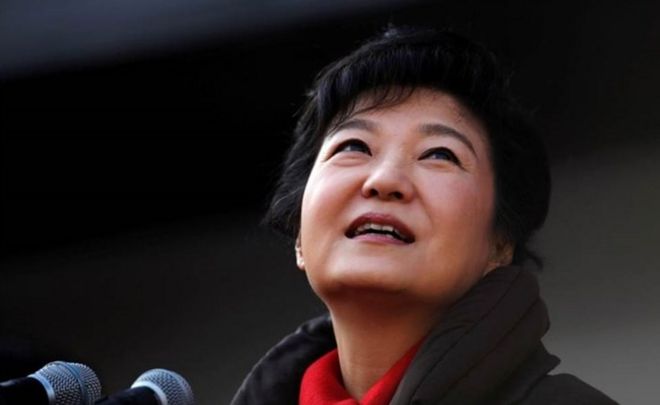 Image copyrightREUTERS
Image copyrightREUTERSSouth Korea’s President Park Geun-hye has become the country’s first democratically elected leader to be forced from office.
Judges unanimously upheld Parliament’s decision to impeach Ms Park over her role in a corruption scandal involving close friend Choi Soon-sil.
She now loses her presidential immunity and could face criminal charges.
There are reports one person protesting outside court in support of Ms Park has died – details are still emerging.
The court ruling is the culmination of months of turmoil which brought South Koreans to the streets in protest.
Ms Park has been suspended from presidential duties since December, when parliament voted to impeach her, with the country’s prime minister taking over her responsibilities.
The court decision means South Korea must now elect a new president by early May.
Ms Choi meanwhile has been charged with bribery and corruption for allegedly pressuring big companies to give money in return for government favours. Ms Park has been accused of colluding with her. Both women have denied wrongdoing.
Why did she lose her job?
A panel of eight judges at the country’s top court examined several charges related to the impeachment before finally deciding to uphold her dismissal as president.
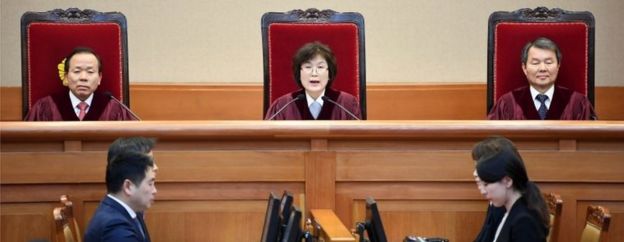 Image copyrightEPA
Image copyrightEPAIt ruled she broke the law by allowing Ms Choi to meddle in state affairs and breached guidelines on official secrets by leaking numerous documents.
Her action “seriously impaired the spirit of… democracy and the rule of law,” said constitutional court chief justice Lee Jung-mi.
The judge added that Ms Park had “concealed completely Choi’s meddling in state affairs and denied it whenever suspicions over the act emerged and even criticised those who raised the suspicions.”
But the court dismissed other charges such as infringement on freedom of press by creating a media blacklist, and inaction during the 2014 Sewol ferry disaster.
What happens now?
Ms Park must now leave office and a presidential election will be called within the next 60 days.
She could also face criminal charges. Prosecutors have already accused her of playing a significant role in Ms Choi’s alleged corruption, but were prevented from ordering her arrest because of her immunity.
What has been the reaction?
The decision has been met largely with jubilation, but also tears.
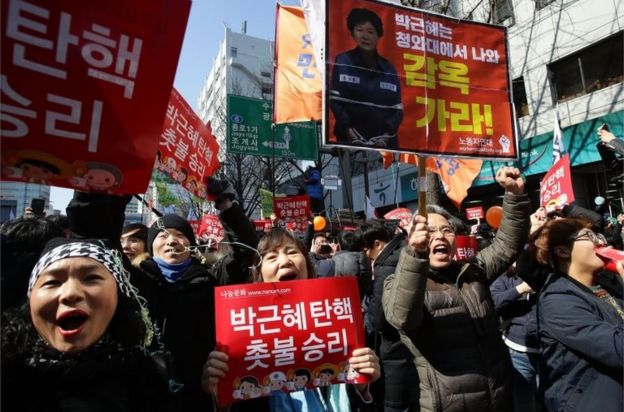 Image copyrightGETTY IMAGES
Image copyrightGETTY IMAGESAs the various twists and turns of the scandal came to light, public fury across South Korea intensified with many staging demonstrations calling for her to step down.
Large crowds of anti-Park activists and Park supporters staged competing demonstrations outside the court building in Seoul on Friday.
What does it mean for South Korea?
The implications are only just becoming clear.
Besides a possible criminal trial for Ms Park, there is also the ongoing prosecution of Ms Choi, while the de-facto head of Samsung Lee Jae-yong is facing a string of corruption charges over his role in the scandal.
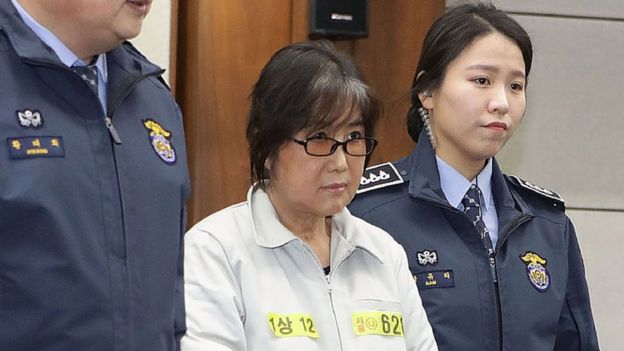 Image copyrightAFP
Image copyrightAFPAnalysts say the protests in recent months have sent a strong signal that the close relationship between politicians and the chaebols – large family businesses that dominate the economy -needs to change.
But South Korean society remains deeply divided, with older conservatives continuing to back her while younger liberals staunch opposing her brand of politics.
A new election could change the political landscape of South Korea. The US swiftly responded saying it looked forward to a “productive relationship” with the next president and promised to remain a “steadfast ally”.
At the scene – Stephen Evans, BBC News, Seoul
The moment the judgement was announced, there was cheering in the streets. But there is also pro-Park feeling.
The country is split and nobody quite knows what will happen. One argument is that if a court can remove a president, democracy is not weak.
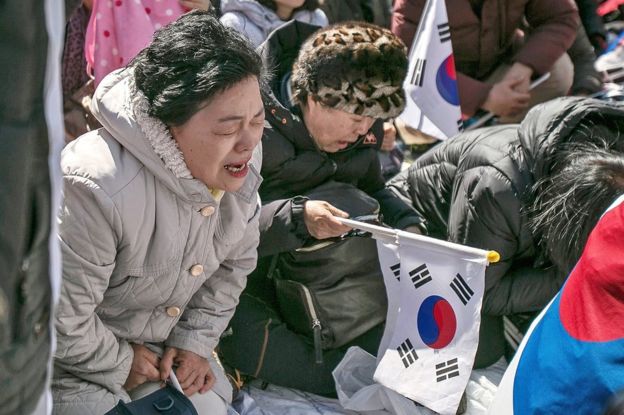 Image copyrightGETTY IMAGES
Image copyrightGETTY IMAGESThe outcome is uncertain, but polls indicate a leftward shift. If the government does move to the left, that has consequences for the relationship with North Korea and the United States.
A leftish government might well re-open the industrial complex just inside North Korea but with South Korean firms and managers. It might also seek more contact with North Korea, running counter to recent US-South Korean policy.
There is also a personal tragedy here. Ms Park is the daughter of Park Chung-hee, the general who seized power in 1961 and who set the country on a route towards industrialisation and democracy. He was assassinated, as was her mother.
She has lived an isolated life ever since, even as president. She has relied on her best friend for 40 years – Choi Soon-sil.
The friendship has cost her the presidency and an honourable place in history. It may now put her behind bars.












